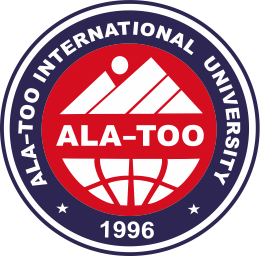International Congress «Prospects of development Central Asia in the XXI Century»
INTERNATIONAL CONGRESS
"THE DEVELOPMENT PROSPECTS OF CENTRAL ASIAN COUNTRIES IN THE XXI CENTURY"
International Ataturk Alatoo Unıversity hosted the internatıonal congress “The
development prospects of Central Asian Countries in the XXI century” on 8-10 October 2015 in
Bishkek, Kyrgyzstan.
Leading researchers, experts and head of international organizations from 10 countries -
the US, Belgium, Turkey, India, Pakistan, Russia, Kazakhstan, Uzbekistan, Tajikistan and
Kyrgyzstan discussed the economic, political and philosophical issues in the context of the
development prospects of Central Asian countries.
Congress Organizer: Silk Road Research Center of the International Ataturk Alatoo University.
Sponsors of the Congress: "Andash Mining Company", “Lion Company”, “Bi Build
Construction” company, Eco - hotel «Green city», Coffee bar “Relax” and KITIAD Kyrgyz -
Turkish Society of Businessmen.
The Keynote speakers of the plenary session of the Congress were:
S. Frederick Starr - Chairman, Central Asia-Caucasus Institute and The Silk Road Program,
School of Advanced International Studies, Johns Hopkins University, Washington, USA; and
Institute of Security and Development Policy, Stockholm.
Jorge Nunez –Research Fellow at the Centre for European Policy Studies, Brussels, Belgium.
Rajat M. Nag - Distinguished Fellow at India’s National Council of Applied Economic
Research, Delhi and a Senior Fellow at the Emerging Markets Forum, a think tank based in
Washington DC Honorary Member of the National Council of Applied Economic India
Bakhtiar Babadjanov - Doctor of historical sciences, senior researcher at the Institute of
Oriental Studies of the Academy of Sciences of Uzbekistan, professor of Tashkent Islamic
Alibek Dzhekshenkulov - Doctor of Political Sciences, former Minister of Foreign Affairs of
Key issues of the Congress were discussed in the following sections:
Economics Section: “The trajectory of economic development of Central Asian countries in the
context of globalization”
I “The trajectory of economic development of Central Asian countries in the context of
II “The development prospects of integration processes in the Central Asian countries in the
context of globalization”
III “The development tendencies of financial system in the Central Asian countries”
Political Section: “Geopolitics and social life of Central Asia in the 21st Century”
I “Government and political movements in Central Asia"
II “Counteracting terrorism and extremism in Central Asia”
III “Values of Islam and radicalism in the life of the Central Asia in the 21st century”
Philosophy: “Philosophical understanding of the development prospects of the countries of
Central Asia in the 21st century”
I “Problems of socio-cultural identity in Central Asia”
II “National and global in the development of the Central Asian countries”
III “Transformation of ethnic customs, traditions and values in the countries of Central Asia”
The "Economics" section concluded that the Congress managed to gather representatives
of the scientific world whose views reflect the wide range of variety approaches to the
development prospects of countries in the Central Asian region. They represented the point of
views of experts from Eastern Europe, Central and Southeast Asia.
Developing strategies for economic development of the Central Asian countries in the
globalizing world economy was the key message of the first session. Well-known professors
Ram Upendra (India), Jorge Nunez (Belgium), Susmita Dasgupta (India), Musaeva D.A.
(Kyrgyzstan), Mukimova N. (Tajikistan)presented their articles and shared their views.
The works of Professor A.Migranyan (Russian Academy of Sciences, Moscow), Dr. Sima
Baidya (New Delhi, India), Siberian Academy of Sciences’ associate G.Litvintseva (Russia), Dr.
S.Bekbolotova (CEU, Hungary) were devoted to the development problems of integration and
migration processes in the region in the second session.
Speakers of the third session, Kyrgyz scientists, M.Koychueva (KRSU, KR) Sh.Atahanov,
N.Atabaeva (KR), N.Esenalieva (KR) gave an analysis of the role of the financial system in
economic development. Young scientists participated in the discussions.
In the section, "Politics" speeches were presented by the Head of the Independent Media
Association of Tajikistan Nuriddin Karshiboev, political analyst from Kazakhstan Akbota
Dzholdasbekova historian from Tashkent Aziz Tatybaev, D.Sc. Ashirbek Muminov from Astana,
the Kazakh expert on Islamic history Nurlan Kayyrbekov. The representative of the CIS
Antiterrorist Center of the Central Asian region, Colonel Mukhtar Kaliev presented analytical
information "Current situation in the field of combating terrorism and extremism in Central
A.Taylakova and G.Adilova made speeches on ecological safety, the lecturer of the Institute
of National Security Committee, Colonel M.Abdyldaev made a report on the prevention of
religious extremism, the representative of the State Committee on Religious Affairs of the
Kyrgyz Republic Z.Chotaev highlighted main aspects of Kyrgyzstan’s religious policy. Doctor
of Philology K.Mambetaliev provided information on the publication of archival documents and
materials on the uprising in 1916.
The article of historian Ashirbek Muminov from Astana raised particular interest; he
presented his interpretation of the found materials that were previously hidden layers of time. On
the subject of the opening debate arose between him and his colleague, the historian on Islam
Bakhtiyar Babajanov from Tashkent. This was a brilliant example of scientific controversy,
which became an exemplary fact of expert discussion.
In the section "Philosophy" 14 speakers representing such countries as India,
Kazakhstan, Kyrgyzstan, Russia and Tadzhikistan delivered speeches. They have considered the
problem of social identity and its types such as regional identity, national identity, gender
identity, etc. focusing on the issues of national and global in the life of the Central Asian
countries, as well as ways of preserving the national identity based on regional integration in the
area of the region. It was emphasized that the process of transformation of ethnic customs,
traditions and values in the countries of Central Asia taking place, speakers identified the main
factors of the process.
Frederick Starr’s Speech in plenary session and its active participation in the discussions in
the sessions, his theoretical arguments and polemical speech appeared as a classic exclusive one
of the most authoritative leaders of the world political science.
Some of the scientist’s developments were first heard at the congress, and further they will be
available worldwide. Articles of the congress participants are published in the scientific journal
of the University «Alatoo Academic Studies».
